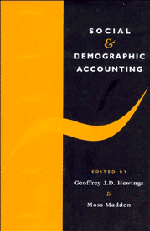Book contents
- Frontmatter
- Contents
- List of contributors
- 1 Social accounting: essays in honour of Sir Richard Stone
- 2 A SAM for Europe: social accounts at the regional level revisited
- 3 Interregional SAMs and capital accounts
- 4 Social accounting matrices and income distribution analysis in Kenya
- 5 Structure of the Bangladesh interregional social accounting system: a comparison of alternative decompositions
- 6 Decompositions of regional input–output tables
- 7 Consistency in regional demo-economic models: the case of the northern Netherlands
- 8 A CGE solution to the household rigidity problem in extended input–output models
- 9 Operationalising a rural–urban general equilibrium model using a bi-regional SAM
- 10 Combatting demographic innumeracy with social accounting principles: heterogeneity, selection, and the dynamics of interdependent populations
- 11 A micro-simulation approach to demographic and social accounting
- Bibliography
- Index
1 - Social accounting: essays in honour of Sir Richard Stone
Published online by Cambridge University Press: 10 October 2009
- Frontmatter
- Contents
- List of contributors
- 1 Social accounting: essays in honour of Sir Richard Stone
- 2 A SAM for Europe: social accounts at the regional level revisited
- 3 Interregional SAMs and capital accounts
- 4 Social accounting matrices and income distribution analysis in Kenya
- 5 Structure of the Bangladesh interregional social accounting system: a comparison of alternative decompositions
- 6 Decompositions of regional input–output tables
- 7 Consistency in regional demo-economic models: the case of the northern Netherlands
- 8 A CGE solution to the household rigidity problem in extended input–output models
- 9 Operationalising a rural–urban general equilibrium model using a bi-regional SAM
- 10 Combatting demographic innumeracy with social accounting principles: heterogeneity, selection, and the dynamics of interdependent populations
- 11 A micro-simulation approach to demographic and social accounting
- Bibliography
- Index
Summary
Richard Stone was awarded the Nobel Prize in Economic Science in 1984; in the citation describing his contributions to economics, the Royal Swedish Academy of Sciences commented:
The theoretical analysis of national economic balance problems was perceived by Stone as the starting point and justification for national accounts. Although it was primarily the Keynesian revolution in economics which provided the strongest impulse towards the construction of national accounts systems, these systems may currently be regarded as ‘neutral’ from both an analytical and ideological point of view. The systems are applied by all analytical streams within economic science and in all types of countries. National accounts have thus created a systematic data base for a number of different types of economic analysis, the analysis of economic structures, growth analysis and, particularly, international comparisons between countries in these respects.
(Royal Swedish Academy of Sciences, 1985)Stone's contributions to social accounting (broadly defined) have extended into many fields and many countries; hence, it would have been impossible to represent these contributions within a single volume. In addition, the impact of his work has extended far beyond his initial conceptions in analytical sophistication, problem area and spatial scales of analysis. The collection of essays in this volume honours the individual for his perspicacity in sensing the importance of accounting frameworks, and recognises the various fields of social science that have been able to build upon and expand his conception of the structure of socio-economic systems.
- Type
- Chapter
- Information
- Social and Demographic Accounting , pp. 1 - 14Publisher: Cambridge University PressPrint publication year: 1995



